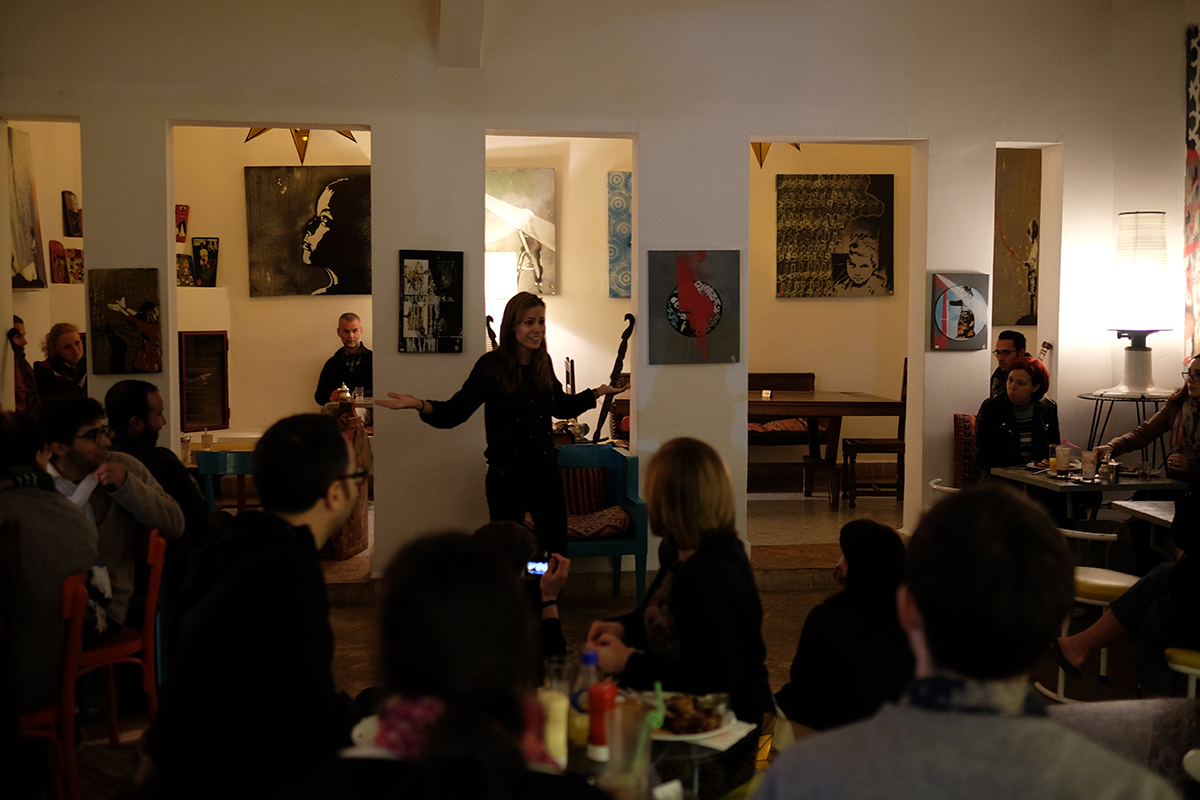The Moroccan tradition of storytelling, dubbed hikayat, dates back over 1,000 years to a time when Marrakech was a young city. Berber general-kings governed the land and Morocco was growing rich from the gold and spice trade. Storytelling was a way to pass on cultural beliefs, teach children moral lessons, and serve as a form of entertainment on long winter nights. Once common throughout Morocco, today hikayat is practiced primarily at Marrakech’s Djemaa el-Fna square, where there is a revival of sorts underway with the city’s youth. Aware of the tradition disappearing from city squares and cultural events around Morocco, including Marrakech’s most famous square, younger Moroccans are joining apprenticeship groups to learn the stories and ways of storytelling from Master Storytellers. Determined to keep their heritage from fading, these young people are on a mission to preserve the tradition one story at a time.
Learning from the Masters
Young apprentices are learning from Master Storytellers and plying their craft at local establishments and through cultural programs. Master Storytellers spend decades collecting stories, fine-tuning their craft, and performing at squares around Morocco. For centuries, Djemaa el-Fna was the most prestigious stage for Morocco’s storytellers. But with Marrakech’s legendary square filling up with vendors, juice stands and traffic, there is less room for the great storytellers to hone their craft. With public spaces around Morocco becoming more difficult locations in which to perform, these artists are shifting to cafés and cultural programs. The new locations are bringing Moroccan stories to a wider, more diverse audience.
“There's a saying in Morocco that when a storyteller dies, a library burns," Master Storyteller Hajj Ahmed Ezzarghani told Aljazeera.

Many young Moroccans are determined to reinvigorate the tradition. To prevent these living libraries from being lost as the older generation retires or passes away, these younger apprentices are learning from Master Storytellers at apprenticeship groups. Later, they’ll take the stage to share traditional tales with foreigners and Moroccans alike. These young people understand the importance of celebrating the tradition of hikayat.
A Respected and Honoured Tradition
“It's really important to keep this wonderful tradition alive because it helps people understand Moroccan culture. Storytelling also gets people together. And it keeps Morocco connected to its tradition and heritage,” explained Malika Ben Allal, an apprentice in a storytelling group at a local spot, Café Clock.

In Morocco, storytelling is still a respected and honoured tradition. “A storyteller has stories of your culture,” Ahmed Ezzarghani told the Middle East Eye. “When you respect him, when you take care of him, you are taking care of your own culture.”

Moroccan stories have simple names reflecting the oral tradition. The King and The Thief; The Lion, the Hedgehog and the Donkey; The Teacher and The Woman are three very common stories. They’re similar in style to parables, illustrating moral or spiritual lessons. Throw in a good dose of drama to keep it entertaining and a couple of Moroccan jokes to keep it light (they do sometimes get lost in translation), and storytellers can keep crowds entertained for hours.
It's Not About the story
“What I love about the Moroccan stories is that they are full of wisdom and they all have morals.” Ben Allal shared, “And of course because I enjoy listening to a story. I think all people love stories.”
A traditional storytelling evening is not just about the story, it’s also about the listeners, explains Ben Allal: “The most important lesson the Master Storyteller taught me about telling a story is how to make the audience smile at the end of it.” It is both about the lesson and the experience. Because Moroccan storytelling developed as both a form of entertainment and a way for elders to teach their children, it’s an intimate affair. Whether at the large Djemaa el-Fna or in a café, listeners huddle close around the storyteller to catch every word and gesture.
Add a Moroccan storytelling evening to your Marrakech travels
At the Djemaa el-Fna, you can still catch many of the sage Masters working their magic to crowds of transfixed listeners. Storytellers work nightly at the square. All stories are told in Arabic. It is customary to tip the teller a few dirhams.
Alternatively, stop by Café Clock, just a 15-minute walk from Djemaa el-Fna. On Thursday evenings at 7pm, Master Storyteller Hajj Ahmed Ezzarghani, apprentice Malika Ben Allal and other storytellers perform Morocco’s most famous stories in both Arabic and English. Admission is free and the restaurant’s Moroccan-Arab-Western fusion cuisine is excellent (purchasing a meal or drink is not required). Grab dinner and revel in 1,000 years of Moroccan tradition.
Getting there
Want to tell your own Moroccan story? Hop on a G Adventures trip to Morocco and practice in Marrakech. G Adventures runs a number of departures in Morocco encompassing a wide range of departure dates and activities to cater for different tastes. We’re thrilled at the prospect of showing you this big blue planet of ours — check out our small group trips here.























